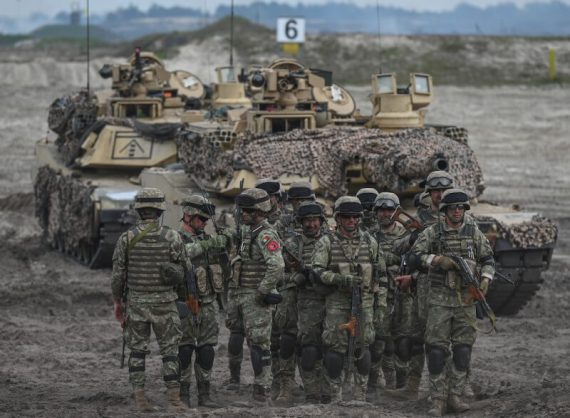I
n a significant turn of events that could reshape the landscape of international arms control, NATO allies have suspended their participation in the Treaty of Conventional Armed Forces in Europe (CFE), a pivotal Cold War-era security agreement. This development came shortly after Russia announced its formal withdrawal from the treaty.
Signed in November 1990, amidst the disintegration of the Soviet bloc, the CFE treaty was designed to avert the accumulation of armed forces along the borders of NATO and Warsaw Pact countries. While the pact was signed over three decades ago, full ratification was not achieved until two years later.
NATO defended its decision to freeze the treaty, stating that the alliance could not continue to comply with the agreement while Russia failed to do so, calling such a situation “unsustainable.”
NATO’s expansion towards Russian borders
Moscow’s withdrawal has been attributed partially to NATO’s expansion towards Russian borders—a longstanding grievance of the Kremlin. The withdrawal process was set in motion by Russian lawmakers who endorsed a bill put forward by President Vladimir Putin to denounce the CFE.
U.S. National Security Adviser Jake Sullivan remarked that the suspension of the treaty by NATO members enhances their defensive capabilities by lifting certain restrictions that are no longer applicable to Russia, thereby bolstering deterrence and defense.
In response to the withdrawal, the German Foreign Ministry affirmed that Germany and its allies remain part of the treaty, suggesting that reimplementation might be possible if Russia alters its approach. The ministry reiterated Germany’s commitment to the treaty’s weapons limits and condemned Russia’s decision to withdraw, stating it undermines another foundation of European security.
The disruption of the CFE treaty adds to a series of deteriorations in arms control agreements involving Russia and the United States. This includes the suspension of the New START Treaty by Russia earlier this year and the mutual withdrawal from the Intermediate-range Nuclear Forces Treaty in 2019.
A continued erosion of arms control frameworks
Experts like William Alberque, director of Strategy, Technology, and Arms Control at The International Institute for Strategic Studies, called for increased transparency and measures to prevent the escalation of military competition into an arms race.
With the disbandment of the Warsaw Pact shortly after the CFE’s inception and unsuccessful attempts to renegotiate its terms, the treaty has faced challenges for years. Russia’s suspension of its participation in 2007 and the recent full withdrawal signal a continued erosion of arms control frameworks.
The Russian Foreign Ministry blamed the West for its withdrawal, suggesting that dialogue for the treaty’s viability was ignored by NATO members. The ministry also cited the security developments in Ukraine and NATO’s expansion as reasons for the treaty’s unsuitability from Russia’s perspective.
Despite the withdrawal, NATO has expressed its ongoing commitment to reducing military risks and preventing conflict through continued dialogue and assessments of the security environment’s impact on the Euro-Atlantic region.
The future of arms control in Europe remains uncertain, with NATO’s latest move marking a pivotal moment in a rapidly evolving security landscape.
Source: The Associated Press
Recommended





